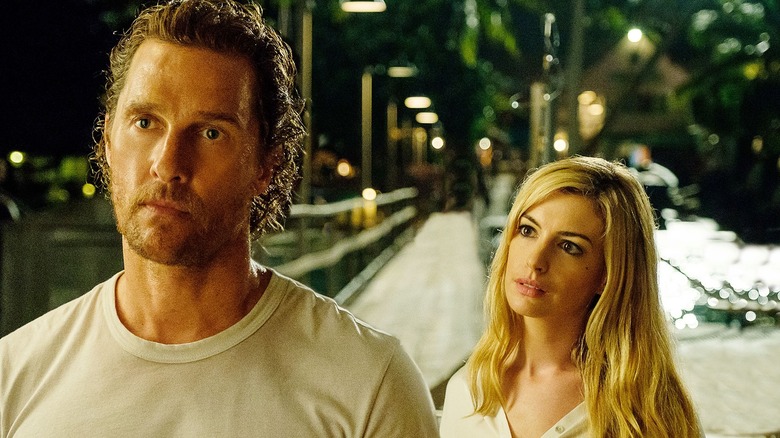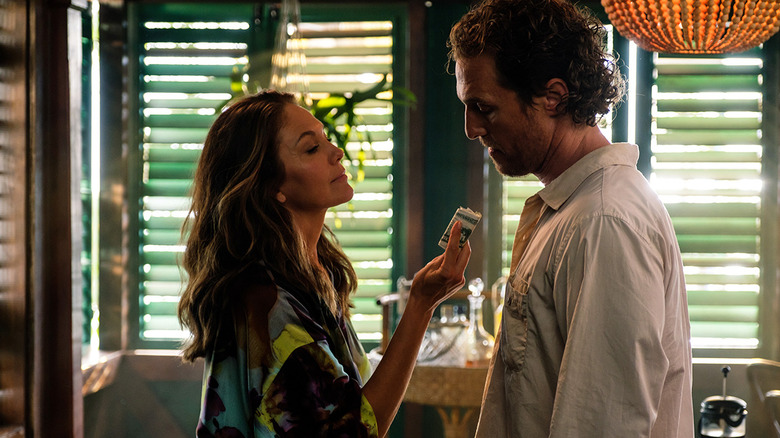The Ending Of Serenity Explained
During the course of a given movie release year, there are some good movies, some bad ones, and a few great ones. If you're really lucky, though, you'll also get at least one movie that feels completely out of its mind. In 2019, that film was "Serenity," a thriller starring Matthew McConaughey, Anne Hathaway, and Jason Clarke.
The film tells the story of Baker Dill, a secluded boat captain living on the tropical Plymouth Island. Baker makes his living carting tourists around the island in his boat, and he's also obsessed with catching a gigantic tuna. When Dill's ex-wife Karen (Hathaway) tracks him down, she asks him to kill her new, abusive ex-husband Frank (Clarke) and offers Dill $10 million to complete the job.
The rest of the movie plays out as Baker debates whether or not to go through with his ex-wife's request. Meanwhile, strange things begin happening around Dill that make it clear that everything in his life is not exactly as it seems.
Baker is living inside of a video game.
In the final moments of the movie, it becomes clear that Dill is trapped in a video game that has been programmed by his real-life son, Patrick (Rafael Sayegh). Dill is based on John Mason, Patrick's actual father who died in Iraq in 2006. Patrick programmed the game based on a memory he had of his father taking him fishing when he was young.
When Patrick's mother remarried, Patrick decided to include both his mother and her new husband in the game. Then, it becomes Dill's decision how he is going to proceed. Is he going to go through with the murder, or is he going to let his ex-wife and his child continue to be abused? Dill ultimately decides to go through with the murder, defying his programming and changing the very nature of the game that Patrick created.
Baker's decision also changes the course of Patrick's life. After Baker decides to kill his stepfather in the game, Patrick decides to take the same action in real life, murdering his stepfather and saving both himself and his mother from further abuse.
Serenity is about the nature of choices
As bug-nuts as that twist may seem, it's even crazier to watch it play out in real-time. Even so, there's a reason that writer-director Steven Knight decided to use video games in particular as the medium for Patrick's decision. The idea that the story we're watching has all been fictional isn't new at all. Plenty of movies turn out to be films within films, or artful renditions of novels, and some, like "Atonement," make great use of that extra fictional layer.
Suggesting that the movie the audience has been watching is actually a video game is somewhat novel, though, and it gets at something unique about video games that isn't true of something like a novel. Video games are all about the choices that players can make. Characters can wind their way through a game in a number of different ways, and when faced with a tricky moral conundrum, a character — and the person who's playing them — can choose to do a number of different things.
Dill's doubts about what to do reflect Patrick's own uncertainties
In the context of "Serenity," it's clear that Dill's uncertainty about whether to kill Frank is a reflection of Patrick's own internal struggle about what he should do. When Dill ultimately decides to go through with the plan, it's because Patrick has made his choice in real life. Both Patrick and Dill have done something radical to change their own circumstances.
"Serenity" is a reflection of Patrick's broken life. He creates the game to find some control after losing his father and realizing that he can't protect his mother. Ultimately, the game is a way for him to process everything that's happening in his real life, and regain agency over his own narrative. When he decides to kill Frank, he does so after playing the game.
Although the twist of "Serenity" reveals the truth — that all of the film's principal characters are trapped in a video game — it does that not just because it's shocking. It does it to unveil a deeper, more emotional story that's been underneath the whole time. Even if you find the whole thing kind of silly, you have to appreciate what the movie is going for. It's earnest and very self-serious, maybe even to a fault, but it's also what gives the movie its meaning.



